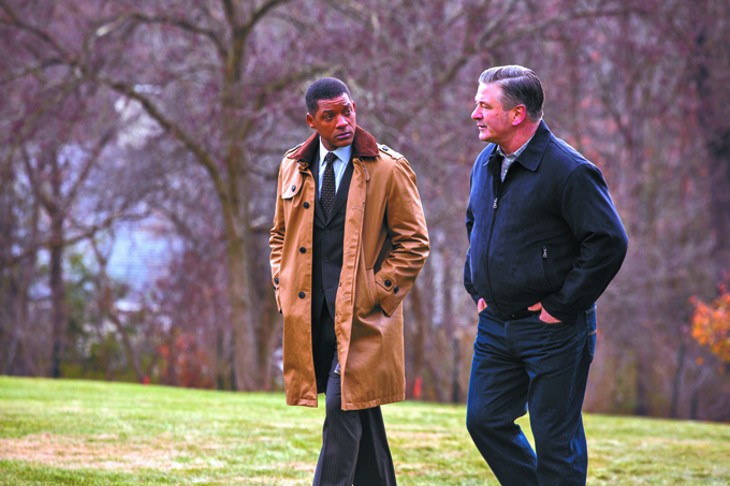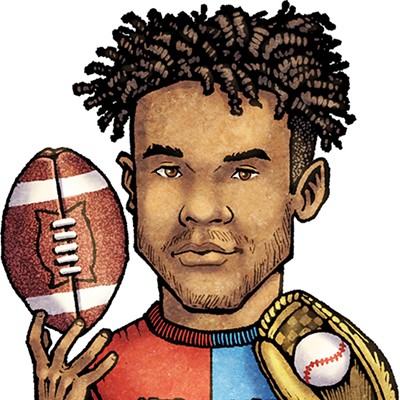Athletes call a concussion “getting your bell rung,” and it’s a remarkably on-point idiom to describe the injury. When Pittsburgh Steelers center Mike Webster’s head took a high-speed, direct impact on the field, his brain literally bounced against the inside of his skull, like the clapper of a bell slamming into the sound rim. It happened repeatedly during his career.
If the brain takes too many hits, deposits of tau protein attack the player’s brain cells, and the result is a catastrophic, often self-destructive dementia known as chronic traumatic encephalopathy (CTE).
In a protracted flat-earth argument, the National Football League denied that there was a cause-and-effect relationship between direct helmet collisions and the CTE that ultimately killed Webster in 2002 and caused several of his fellow players to commit suicide.
The NFL finally acknowledged the phenomenon in 2009 and reached a settlement in a class-action lawsuit in August 2013, but the organization’s pugnacious science denial ranks up there with climate change “truthers.”
Writer-director Peter Landesman’s Concussion takes a central piece of this story — the research by Nigerian-born pathologist Bennet Omalu that ultimately forced the NFL’s hand — and turns it into a frustratingly by-the-book David versus Goliath drama.
With Will Smith stoically portraying Omalu, Concussion settles for star-focused melodrama when the story deserves a point-by-point dissection along the lines of All the President’s Men, Zodiac or 2015’s Spotlight.
Concussion begins promisingly with a section on Webster, who is played with remarkable accuracy by the great David Morse. A true icon of Steelers history, Webster spent some of his final days living in his truck, having lost everything to over a decade of post-career spiraling.
Omalu, a pathologist in the Allegheny County Coroner’s Office, does not know anything about “Iron Mike” when the fallen star winds up on his table, but he examines his brain and recognizes the degradation.
What follows is an often affecting but reductive depiction of the story. The deaths of Webster, fellow Steeler Justin Strzelczyk (Matthew Willig) and Philadelphia Eagles safety Andre Waters (Richard T. Jones) feel as though they are taking place within weeks of one another when each was separated by two years.
Webster’s own late-’90s disability claim against the NFL stays in the background, as do many of the other doctors and journalists who helped bring the true story to light.
Instead, Landesman cedes time to the B-story centered on Omalu and his young wife Prema (Gugu Mbatha-Raw), including the de rigueur threatening phone calls and mysterious cars following too closely. And while Smith plays Omalu as a quiet, brooding man on a mission, the performance is a far cry from the animated, gregarious Omalu who can be seen in the 2013 Frontline episode “League of Denial: The NFL’s Concussion Crisis.” Smith saddles Omalu with the weight of watery-eyed gravitas when something close to the real man would be just as effective, if not more so.
Granted, others in this fight, such as former Steelers team neurosurgeon Dr. Julian Bailes (Alec Baldwin) and Allegheny County Coroner Dr. Cyril Wecht (Albert Brooks), get their moment, but Concussion begs for a more multidimensional telling.
Also, much of the action portrayed in the film between Bailes and Webster actually took place between Webster and Bob Fitzsimmons, the West Virginia lawyer who filed the disability claim with the NFL on Webster’s behalf. Fitzsimmons is nowhere to be found, nor is Chris Nowinski, the Harvard-educated former WWE wrestler and CTE crusader who joined Bailes, Fitzsimmons and Omalu in their research efforts.
Nowinski, who wrestled as “Chris Harvard” before sustaining a head injury in the ring, certainly qualifies as a cinematic figure, yet he got excised. Both he and Fitzsimmons were in Jeanne Marie Laskas’ GQ story “Game Brain” and her subsequent book Concussion, but their screen time lost out to Omalu’s family drama.
Omalu is unquestionably a noble man who performed brave work despite an $8 billion corporation’s brutalizing efforts to quash his findings.
But the saddest flaw in the film is the sparse time spent with the victims. In most cases, viewers spend only a few moments with these wrecked former players before they die.
Without Omalu, their stories would not be told, but Landesman spends the bare minimum time required with them in order to pitch things back to Omalu and bring the focus back to Smith.
This is a fresh story that is still in the headlines. In December, ESPN commentator and former New York Giants quarterback Danny Kanell, ripping a page from the Fox News playbook, called Concussion and the “liberal media’s” coverage of Omalu’s efforts part of the “war on football.”
Unfortunately, Concussion should have been a much better weapon in the war on willful ignorance.
https://youtu.be/Io6hPdC41RMPrint headline: Head games, Concussion takes a soft-eyed look at football-related brain damage.













